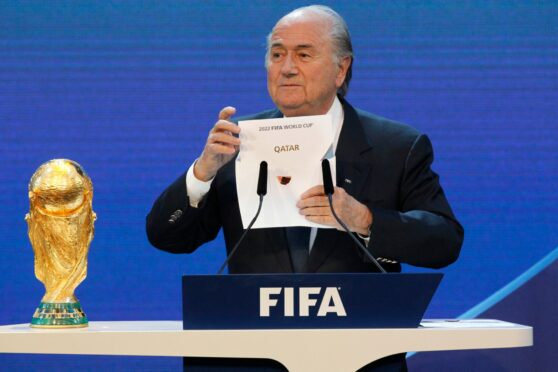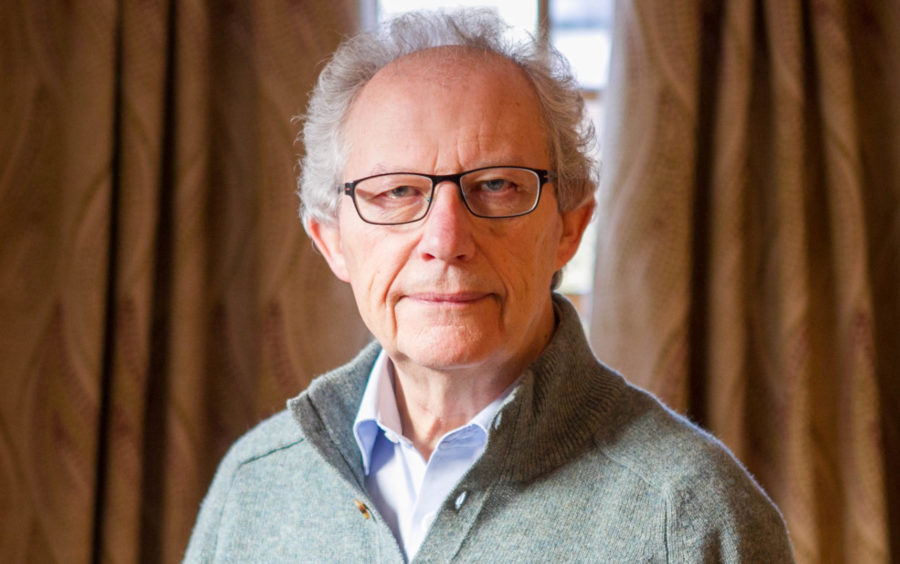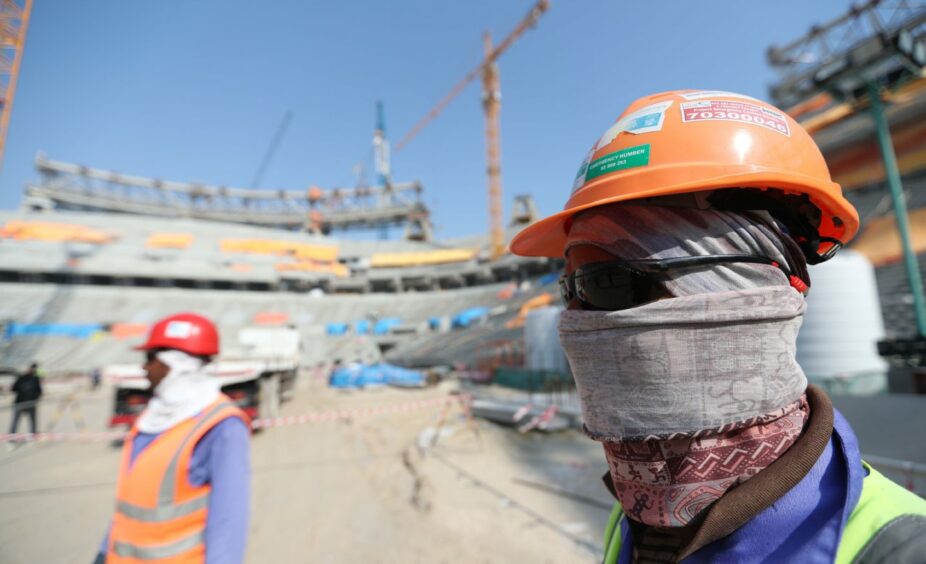
The Scottish Football Association came under mounting pressure not to attend the opening ceremony of the World Cup in Qatar yesterday as the country’s human rights record came under renewed scrutiny.
Former first minister Henry McLeish, who led a landmark review of the sport in Scotland, led calls for the football authorities to stay away as fans’ groups, human rights watchdogs, trade unions and politicians echoed concern.
The SFA is expected to be represented at the tournament’s showcase opening ceremony in Qatari capital Doha on November 20, but the choice of the country to host the World Cup has attracted relentless criticism over the exploitation of construction workers building the new stadiums and its opposition to homosexuality.
International trade unions fear 7,000 immigrant workers may have died while building the spectacular grounds in searing heat and McLeish said: “I would say to the SFA, don’t go. This is not about the beautiful game being celebrated every four years. This is about Qatar. This is about human rights violations.
“Scotland didn’t even qualify for the World Cup so I’m not sure what the thinking is behind being represented at the opening. What purpose is served by giving credence to such a country in the world? “It is high time that football, like other sports, woke up to the fact that human rights are important to people who watch and play the game in Scotland. It will strike most Scots that we have missed an opportunity to make a statement about how we feel about the protection of human rights.”
LGBT activist Peter Tatchell was last week halted by police in Doha as he protested the country’s intolerance of gay rights. Yesterday, he also questioned the SFA’s decision to attend the opening ceremony, saying: “I am calling on the SFA to boycott the World Cup and stand in solidarity with the brave Qataris struggling for democracy and human rights.”
Scottish Labour MSP Paul Sweeney also called on the SFA to review its decision, saying: “Given their abhorrent human rights record and their continued persecution of the LGBT community, it is absurd that the SFA are sending representatives to Qatar. The SFA would be wise to rethink this decision.”
Scotland failed to qualify for the World Cup after losing to Ukraine in a play-off in June and fans say the footballing authorities should now reconsider attending the tournament.
Hamish Husband, spokesman for the West of Scotland Tartan Army, said: “The SFA should think again. Many fans faced a dilemma when it was still possible for Scotland to qualify for the World Cup. I had decided I wouldn’t attend. Some people were saying ‘where do you draw the line?’ but you have to draw it somewhere and being there validates a regime with a shocking record on human rights.”
On Thursday, Australia released a collective statement against Qatar’s human rights record, becoming the first 2022 World Cup team to do so. The same day, it was revealed that English FA president Prince William will not travel to watch England play in the World Cup amid the growing row over Qatar’s human rights record.
On Friday, the Middle East country’s foreign ministry summoned the German ambassador after its interior minister criticised Qatar’s human rights record in a broadcast interview .
Denmark’s strip for the tournament has been designed to highlight concerns over human rights while their third strip is all-black to honour the workers who died during the construction of stadiums and infrastructure.
A number of French cities including Lille, Strasbourg and Bordeaux said they will not organise fan zones or put up giant outdoor screens to show Qatar World Cup soccer matches because of humanitarian concerns.
The SFA’s chief executive Ian Maxwell is expected to travel to the Middle East for the tournament’s opening ceremony but Naomi McAuliffe, Scotland programme director for Amnesty International, said she intends to write to him to protest the planned trip.
She said: “We will be bringing our calls and research on the extreme abuse and resulting deaths of migrant workers to his attention before he travels.”
While many observers were urging the SFA to stay at home yesterday, others said they should go to help make clear their concern about the country’s human rights record.
Scottish Lib Dems external affairs spokesman Willie Rennie said the SFA delegation should attend but make clear their condemnation of the treatment of minorities in Qatar: “I think the SFA should go but they need to make it clear what Scotland’s view is of the treatment of minorities in Qatar.”
Andy Smith, chairman of the Scottish Football Supporters Association, said he hoped when the SFA is in Qatar its representatives will raise concerns with Fifa over the negative issues surrounding the competition.
Scottish TUC General Secretary Roz Foyer urged the SFA officials to “skip the ceremonies and cordials and instead call out Qatar for the lethal conditions faced by migrant workers in building this tournament”.
She added: “A total of 6,800 migrant workers have paid with their lives for this World Cup. That can never be excused, forgiven nor repeated.
“The Scottish FA – in partnership with our trade union movement, civic and equality organisations across the country – have a moral obligation to seek justice for those who have died. We intend to do so and would invite the Scottish FA to do likewise when they visit Qatar.”
The SFA insisted any of its representatives attending would come straight back to Scotland the day after the opening ceremony. It added: “As a member of the association of Uefa and Fifa, we are aware that these matters have been raised by Uefa’s working group on Qatar to Fifa’s general secretary and we have been kept informed on developments along with colleagues from the home nations and across Europe.
“The Scottish FA will continue to contribute to this forum in support of improvement in human rights in Qatar and to ensure the forthcoming World Cup is a welcoming, safe and inclusive tournament experience for all.”
It added: “We are supportive of all measures to improve human rights in Qatar.”
The Scottish Government confirmed it had no plans to send ministers or officials to the World Cup in Qatar but declined to comment on the SFA trip, saying: “This is a matter for the SFA.”
Additional reporting by Mark Aitken and Peter Swindon
Risk of arrest was real and so was the horror. This World Cup is built on blood and tears
By Mark Aitken, Sunday Post political editor
Six years ago, I travelled to Qatar and, in a series of secret visits to workers’ camps, discovered the intolerable conditions endured there. The men, all of them migrants, building Qatar’s spectacular World Cup stadiums spoke of their fear and exhaustion and, while the risk that we might be arrested was real, so too was the horror.
Qatar 2022 chief executive Nasser Al Khater last month claimed the Gulf state had received unfair criticism “not based on factual reality” but when I visited the workers’ camps in 2014, with politician Jim Murphy, we witnessed the misery and squalor suffered by thousands of impoverished labourers who built the stadiums, hotels and roads to be used by one million football fans next month.
We discovered how employers had confiscated labourers’ passports to stop them fleeing and how many workers had not seen their families for years.
We were also told of healthy young men dying from heart attacks and heat exhaustion from working in searing temperatures. One worker told us: “We are trapped in a nightmare. We are treated like animals, not human beings.”
In April 2014, I joined Murphy, who was then Labour’s shadow international development secretary, on a fact-finding investigation organised by the International Trade Union Confederation.
Under cover of darkness, despite the risk of arrest and imprisonment, we visited camps to witness the truth about the plight of the migrant workforce. One camp, just a half-hour drive from the gleaming city skyline of Doha, housed more than 2,000 men in slum-like conditions. The toilets were holes in the floor, the smell was overwhelming.
Dirty water or sewage flowed beneath our feet and workers cooked their food on filthy, grimy grills and stoves with no sign of fridges or freezers.
Workers washed themselves using buckets of water and salty water was used for drinking. Sleeping conditions were no better. Some were packed 12 to a room measuring just four yards square. They revealed how they had paid hundreds of pounds to secure jobs in Qatar through recruitment agencies. But once they had got there, the companies they worked for confiscated their passports. We discovered some were being paid as little as £132 a month – less than the price of some tickets for opening-round matches at the stadiums they had helped to build.
Some of the workers wore football tops but they couldn’t even watch or listen to matches as they had no TVs, radio or internet access.
Arguably they were the lucky ones. Some revealed their employers had not paid them for months, despite desperately needing the money to send to their families back home.
Lahiru, from Sri Lanka, told us how his employer had disappeared and he had not been paid for six months.
“I haven’t seen my wife or son for five years. My son is six now,” he told us at the time. “I keep telling myself I will be home the next month. The truth is that I don’t know when or how I will get home.”
Sajith, from Sri Lanka, lost almost all of the sight in his left eye after a masonry nail went into it. His company did not give him safety glasses, and it was only after his injury that workers were given safety glasses.
He was told by a doctor to take three months off work to recover, but could only afford to take 15 days off as he was not paid while he was sick.
“Being blind in one eye makes the job more difficult but I have to keep working,” he said.
When the beautiful game is played next month, it will be in stadiums built on unnecessary blood, tears and misery, and that, Mr Al Khater, is the “factual reality”.

Enjoy the convenience of having The Sunday Post delivered as a digital ePaper straight to your smartphone, tablet or computer.
Subscribe for only £5.49 a month and enjoy all the benefits of the printed paper as a digital replica.
Subscribe © Chris Austin
© Chris Austin